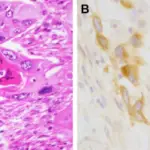Renal cell carcinoma is a carcinoma derivative of the renal tubular epithelium located predominantly in the cortex and has the capability to invade the surrounding structures.
What is the Pathology of Renal Cell Carcinoma?
The pathology of renal cell carcinoma is:
-Etiology: The cause of renal cell carcinoma is sporadic and genetic factors.
-Genes involved: MET gene.
-Pathogenesis: The sequence of events that lead to renal cell carcinoma is multifactorial.
-Morphology: The morphology associated with renal cell carcinoma shows varying size, bright yellow-gray-white tissue spherical masses.
-Histology: The histology associated with renal cell carcinoma shows clear or granular cytoplasm.
How does Renal Cell Carcinoma Present?
Patients with renal cell carcinoma typically have a male preponderance ratio of 2 to 3. The symptoms, features, and clinical findings associated with renal cell carcinoma include costovertebral pain, palpable mass, fever, malaise, weakness, weight loss and hematuria.
How is Renal Cell Carcinoma Diagnosed?
Renal cell carcinoma is diagnosed through the classical features; costovertebral pain, palpable mass, and hematuria. Imaging- CT of the abdomen, preferably with pelvic CT, MRI, ultrasonography, renal arteriography, and venography.
How is Renal Cell Carcinoma Treated?
Renal cell carcinoma is treated by surgery, thermal ablation, active surveillance, radiation therapy, immunotherapy, and molecular-targeted therapy.
What is the Prognosis of Renal Cell Carcinoma?
The prognosis of renal cell carcinoma is fair with a 5-year survival rate of about 45%.



